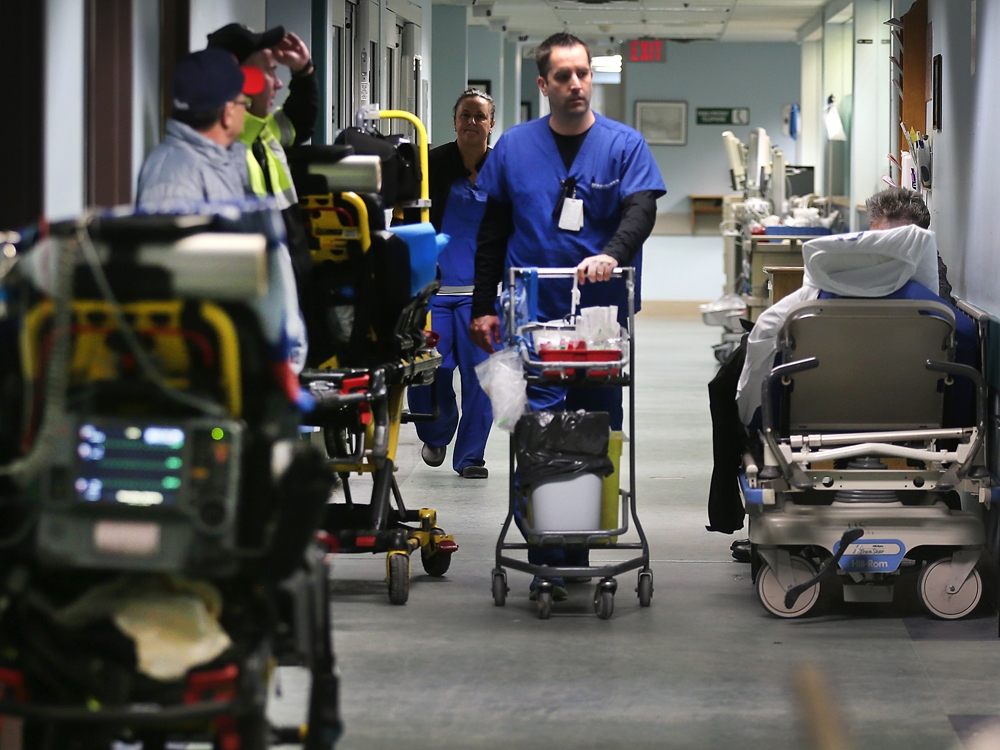STRAUSS: The Politics of Health Care Reform in the Aftermath of COVID-19

Content of the article
By Matt Strauss
Advertisement 2
Content of the article
My esteemed colleague, Dr. David Jacobs, wrote about the best possible arguments for Jean Charest’s candidacy for the Conservative leadership in the National Post on Sunday.
It is true that Charest’s proposals for health reform are necessary. Alas, Charest is the least credible public figure to implement such policies. Policies, especially controversial ones, must be backed by principles in order to always prevail in the political battles to come.
The pragmatic arguments for health care reform hardly need to be made. Last year’s Commonwealth Fund report ranked Canada 10e out of 11 high-income countries in terms of health system performance. Anyone who has ever spent 20 hours waiting to be seen in the ER, or 4 days lying on a stretcher in a hallway waiting for a hospital bed will tell you, the statistics belie sheer inhumanity.
Advertisement 3
Content of the article
Pain, anxiety and sometimes death result from failures in our health care system. It should not be taboo for a politician to seek to copy the success of Norway, Australia or the Netherlands in integrating private provision with public funding.
As premier of Quebec, Charest passed only modest health care reforms after being forced to do so by the Supreme Court of Canada. In the 2005 Challouli against Quebec decision, the judges overturned the ban on private health care in Quebec, finding that it violated the Charter’s right to “personal security, inviolability and liberty”.
You can therefore count on Jean Charest to respect “the security, inviolability and freedom of the person” once forced to do so for procedural reasons, that is to say a decision of the Supreme Court. Will he fight for these rights on principle before the Supreme Court twists his arm?
Advertisement 4
Content of the article
All indications suggest not. Canadians have endured restrictions on their freedom over the past two years as never before. From stay-at-home orders, curfews, mask mandates, vaccination mandates, capacity restrictions and travel restrictions, to bans on visiting loved ones in hospitals or care homes, the pandemic has challenged our traditional understanding of freedom like never before. Most, if not all, of these measures are now considered to have been almost entirely ineffective.
The most notable demonstration against these ineffectual restrictions on our freedom was, of course, the Freedom Convoy in Ottawa. As annoying as the truck horns may be, the protest was fundamentally peaceful. The only person reportedly injured during the three weeks of protests was a disabled Indigenous woman chanting “peace, love and happiness” when she was knocked down by a police horse. Of course, the Trudeau government‘s response to the freedom protests has been to further restrict our freedoms: by invoking the Emergency Act and freezing bank accounts. (All this while simultaneously passing their online censorship bill, C-11.)
Advertisement 5
Content of the article
Notably, Charest brought no defense of our right to “personal security, inviolability and liberty” to bear on these events. On the contrary, he criss-crossed the country protesting against the “anarchy” of the demonstrators.
I witnessed his stump speech in Kingston, Ontario. He was critical of truckers at length and never criticized the Liberal prime minister he hopes to replace. He also, notably for a lawyer and former prime minister, failed to identify the laws he believed the truckers had broken, even after being pressured to do so by questions from the public. (I guess the answer would have been “parking regulations,” but precisely naming the violations would have robbed his denunciations of their rhetorical thunder instead.)
Advertising 6
Content of the article
Basically, the truckers demanded the same right “to inviolability and freedom” that animated the majority opinion in Challouli. When our health care system fails to replace your hip in a timely manner, you have the right to seek private sector assistance. When our healthcare system fails to meet the Covid-19-induced demand for intensive care beds, you must retain your civil liberties.
Universal health care is a great ideal, but when the state fails to deliver it, we cannot be forced to sacrifice our basic Charter rights as scapegoats for their administrative incompetence.
Sacrificing scapegoats might assuage state guilt in the eyes of an angry electorate, but it does little to actually improve health care. As dear Dr. Jacobs must know, vaccinated and unvaccinated people are equally capable of transmitting Covid-19 (see Table 1). The mandates did nothing to protect health care human resources, so provincial governments stopped enforcing them.
Advertising 7
Content of the article
Rather than leading from a position of principle, months after the truckers’ protest, Charest still sought to defer decision-making on this issue to anyone claiming to be a health expert. This is the posture of a partisan seeking to flatter the political center, not of a leader seeking to move the center towards principled conservatism.
It would have been better had Challouli and Zeliotis not had to spend nine years in court fighting for their Charter freedoms. Maybe if the Conservatives find a leader willing to stand up for the basic principles of freedom, the truckers won’t have to.
Matt Strauss is a critical care physician practicing in Ontario. He is the Acting Medical Officer of Health for Haldimand-Norfolk.
